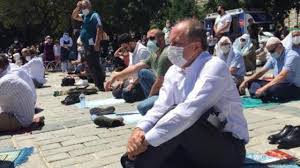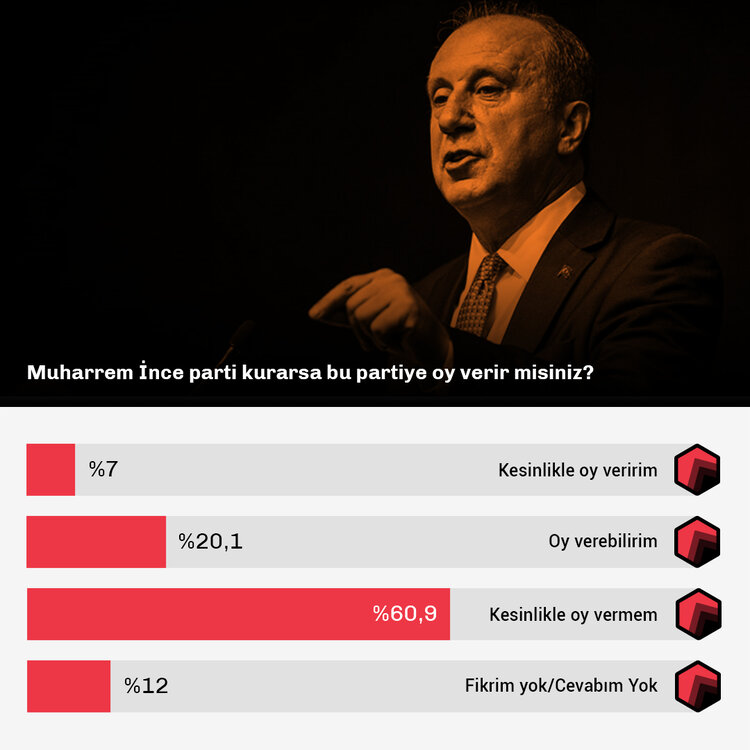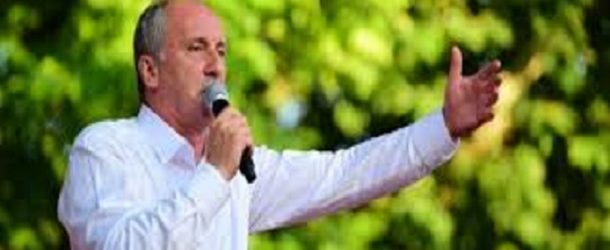Muharrem İnce (1964-)[1] is an experienced Turkish politician who has been a pro-secular Republican People’s Party (CHP) deputy (from Yalova) between 2002 and 2018, five times consecutively (2002, 2007, 2011, 2015, 2015). Due to his charismatic personality and enthusiastic speeches criticizing Turkey’s governing AK Parti (Justice and Development Party) and President Recep Tayyip Erdoğan, İnce had become a political star within his party in the early 2010s. So, CHP’s chair Kemal Kılıçdaroğlu appointed him group deputy chairman and İnce served as CHP’s group deputy chairman within the Turkish Grand National Assembly two terms between 2010 and 2014. İnce’s popularity in the media and his enthusiastic style directed him to challenge Kemal Kılıçdaroğlu for CHP’s leadership two times in September 2014 and February 2018. In both leadership elections, İnce took a lot of votes; but this was not enough to replace Kılıçdaroğlu. İnce also became the Presidential candidate of CHP and Nation Alliance (Millet İttifakı) in the 2018 presidential election. Although he lost the election in the first round with the 30.64 % of the votes against President Erdoğan’s 52.59 %, his high performance in public meetings and demonstrations encouraged him to challenge Kılıçdaroğlu’s leadership once again in 2020. However, he could not become a candidate due to lack of support given to him by the delegates. As a consequence, İnce began to criticize the party leadership and give signals of starting a new political party or movement. Few days ago, he stated that he will start a new political movement -not a political party for the moment- with the name “1.000 Günde Memleket” (Homeland in 1,000 Days). In recent days, Turkish media has been focusing on İnce and his potential to start a new political party. So, in this piece, I am going to analyze and assess whether Muharrem İnce could start a new political party by looking at a public poll recently published by İstanbul Ekonomi Araştırma, a respected poll company in Turkey.[2]

Before getting into polls, I should make some remarks in terms of Political Science and Turkish Politics. First of all, I should underline that Muharrem İnce represents the Kemalist heritage within the CHP, a more pro-secular and nationalist faction within the party compared to pro-EU social democratic faction. After becoming a candidate for Presidency, Muharrem İnce softened his views in terms of relations with the EU and US, however, during his youth; he was a more hawkish Kemalist who was criticizing double standard practices against Turkey during the Turkish accession to EU. Secondly, Muharrem İnce’s criticism of CHP and party leadership of the CHP are supported mostly by the pro-government circles, understandably for realpolitik reasons. Thirdly, I should state that Muharrem İnce is by far the best public speaker within the CHP, however, political leadership is not only about oratory skills; coalition-building, networking, trustworhty image, embracing everyone etc. are other skills that are absolutely needed by a strong leader. However, İnce has a polarizing style due to his harsh secularism understanding and direct attacks towards President Erdoğan and AK Parti. In order to change this perspective, in recent years, İnce has been trying to correct his image and his politics-making style. It is no coincidence that he was one of the rare pro-secular politicians in Turkey who participated to the opening ceremony of the Hagia Sophia (Ayasofya) as a mosque few weeks ago. However, instead of trying to get into the historic building with the state elite, İnce preferred to stay outside and pray with the ordinary people. This shows that İnce has been trying to change his harsh secularist image and embrace conservative/Islamist circles as well.

If we look at the poll results[3], we can clearly understand that Muharrem İnce has a very good vote potential due to his charismatic personality and enthusiastic speeches. I think İnce’s popularity is related to his courage of directly confronting President Erdoğan and criticizing him with the public mouth. While the poll suggests that İnce could immediately get 7 % of the votes if he starts a new political party, there is also another 20.1 % of Turkish people who claim that “they could vote for İnce”. However, İnce’s polarizing personality also appears in the poll since 60.9 % of people state that “they will never vote for İnce”. As Turkey made transition to Presidentialism in 2017, the new system requires minimum 50 %+1 votes to get elected. So, İnce’s polarizing style might not be the best alternative for CHP and other parties of the Nation Alliance (Good Party/İYİ Parti, Felicity Party/Saadet Partisi; plus new and potential members such as Ali Babacan’s DEVA Party and Ahmet Davutoğlu’s Future Party/Gelecek Partisi). So, although in a democratic state everyone has right to start a new political party or movement, looking from the perspective of the opposition, one can easily claim that -at the first glance- İnce’s movement could further divide and harm the opposition in Turkey.
Here, understanding İnce’s strategy is absolutely needed. İnce’s strategy in starting this movement or a new political party in the near future could be to weaken the opposition as well. We know that İnce has a considerable popularity among the Turkish nationalists, especially within the MHP circles. Since MHP is in an alliance with the governing AK Parti under the banner of People’s Alliance (Cumhur İttifakı), İnce’s strategy could be take 1-2 % votes from MHP electorate, so that the Erdoğan will be short of 50 %+1 majority that he needs. Another potential strategy of İnce could be to force the CHP leadership to make him the Presidential candidate once again; since losing İnce before the election would be risky for Kılıçdaroğlu, CHP, and the Nation Alliance. However, a previously defeated candidate might not be the best appealing solution for the opposition in Turkey. So, in the following months, we have to carefully observe how İnce’s movement will evolve, will it transform into a political party, and what CHP will do against İnce’s independent-minded moves?
Finally, although Muharrem İnce’s initiative could be understood at the first glance as a movement against CHP, we know from the earlier experience that, in fact, politics do not evolve according to plans. When two among Turkey’s three left-wing parties merged in the past (SHP/Social Democratic Populist Party and CHP), people expected a huge rise in the votes. However, CHP stayed out of the parliament in 1999 under Deniz Baykal’s leadership. Similarly, the fall of Bülent Ecevit’s DSP (Democratic Left Party) did not increase CHP’s votes since 2002. This shows that, all political parties and leaders appeal to different social groups and the necessary thing is to make them allied at the Presidential election. So, that is why, I think İnce’s movement or party might not be detrimental to the opposition as people think, but in case his party becomes stronger than CHP, of course this could lead to problems.
Assoc. Prof. Dr. Ozan ÖRMECİ
[1] His biography can be read from here; https://en.wikipedia.org/wiki/Muharrem_%C4%B0nce.
[2] The research can be read from here; https://www.turkiyeraporu.com/muharrem-ince-kamuoyu-algisi.
[3] The poll was organized by İstanbul Ekonomi Araştırma company on August 17-18, 2020 with 1,526 interviews in 12 different Turkish cities.

























































